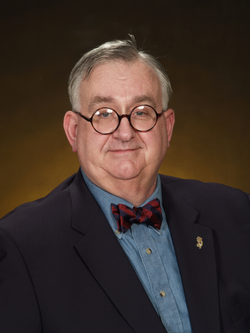Over the past month or so, we have all been enmeshed in the national tragedy of the World Trade Center disaster. We have taken a solid sucker punch to the national solar plexus. If you were like me, you spent days glued to the images flowing from your television sets.
We all shared the same emotions, I am sure. Shock, horror, and disbelief were a great part of the initial round of reactions we all had. How could this happen to us? How could so many normal people perish in literally the blink of an eye?
These emotions led in many cases to anger, and then rage. Many days were spent discussing just exactly whose butt our nation was going to kick. We then laid the whole issue on the doorstep of our military forces. Millions of angry citizens turned to our men and women in uniform.
Not long after the horror of September 11, President Bush asked us all to return our lives to normal. We must not let the terrorists disrupt our lives, he said. If the can knock us out of our normal rhythm of life, he posited, they would win the battle.
As we all struggled to get our personal and organizational compasses back on line, the veiled threat of bio-terrorism began to rear its ugly head. Scattered reports of anthrax exposure began to bubble to the surface. What started out as a few, seemingly unrelated incidents has grown into the dull roar of a national concern.
Once again we are being asked to carry on with our daily lives. I for one am not going to let the terrorists keep me from getting back to the issue of responder safety on the highways.
I must apologize for being away from this critical issue for so long. But I am human, and loss of so many brothers in the New York Fire Department has stunned my sensibilities. It is also extremely difficult for me to wrap my mental arms around the concept of death on such as massive scale.
However people in the fire and emergency service world are still being exposed to danger on the highways. Frankly, the current rash of emergency calls for suspected bio-terrorism incidents has ratcheted our response numbers up to a much higher level.
With this increased demand for our fire, police, and EMS resources, come the dangers inherent in a higher level of responses. Primary among these is the potential for our physically and emotionally depleted emergency response people to lose their mental focus.
Fatigue dulls the senses, and the constant blur of emergency responses wears down our ability to focus in the issues at hand. When you couple this with the emotional state of the average citizen, you have a recipe for increased carnage on the highways. People who are listening to the world news on their car radios can be easily distracted by the latest scare de jour from our friends in the broadcast media world. And these distracted people will hit you. They can injure, maim, or kill you, unless you take extraordinary care to watch out for them.
It could also be that you are operating at such a fever pitch that thoughts regarding safety fly out the window of your speeding mental train. You may be so concerned about the procedures for and exposure to anthrax, small pox or nuclear weapons, that you forget the basics of scene safety.
It only takes a second for a distracted firefighter to step off the wrong side of a fire vehicle into a street filled with passing motorists. In the blink of an eye, a police officer glancing away from the traffic he or she is directing can be sent heavenward by the sudden thump of a careless motorist.
During the last five weeks, we have seen the usual array of highway incidents. But we have buried them away in the inner most recesses of our collective minds. How can one death be important, in the face of such tragedy in New York City, one might say?
But there is the rub ladies and gentlemen. If we allow ourselves to be desensitized toward death in general, we run the risk of becoming callous toward, or just plain ignorant of the concept of death. We may then adopt an attitude that tells us that the occasional death we see is just the cost of doing business in a dangerous world.
Folks, once we lose control of our concern for preventing death and injury, we condemn all within the emergency world to a long-term downward spiral of death, injury, and destruction. Now is the time to reset our highway safety compass of concern.
A recent email message to me from a regular correspondent spoke of a fire department operating at the scene of a working fire on a major local highway. Traffic was weaving in and out of the fire vehicles and crewmembers were dodging Dodges as they stretched their lines in. Hey gang, dead is dead. Whether it is in the fire building or in the street out from, you are only literally a step away from disaster.
Now is the time to concentrate on watching our collective backs. We are busy, we are distracted, we are concerned, and in far too many cases, our resources are stretched thin to get the job done. We must therefore redouble our efforts to keep our eyes on the prize of highway safety.
I would suggest a series of short briefings for all fire, police and EMS personnel. These could very quickly cover the issues of scene safety and control. They could also remind us to stay alert and drive safety. For the bulk of our people, this will be sufficient.
Come on gang. Just like the President has said. Let's get back to the business of highway safety.


